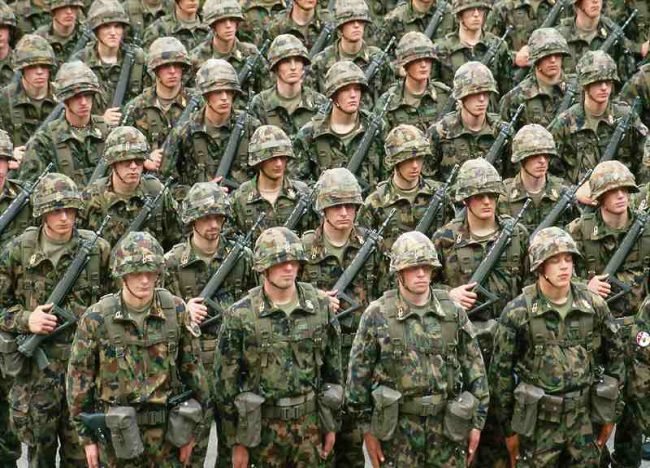“Irresponsible” is one word that sums up the reaction in the Swiss newspapers to parliament’s decision to give more money to the army.
On Wednesday, the House of Representatives followed the Senate in approving SFr600 million ($682 million) more each year for the army than proposed by the cabinet, and agreeing to use some of the additional funds to finance the purchase of new fighter jets.
The new figure will give army heads SFr5 billion a year to spend, instead of the SFr4.4 billion the cabinet favored. The extra cash will go towards training and new fighter jets – the latter a cost that the government wanted to put off.
Parliament also voted to set the minimum number of soldiers in the Swiss militia army at 100,000, which is 25 per cent more than the cabinet wanted to see.
The joint commentary in Bern’s Bund and Zurich’s Tages-Anzeiger says: The decision is irresponsible because it will cost the state enormously. It’s brazen because the controversial purchase of fighter jets is to be part of the normal federal budget and therefore cannot be put to voters and it’s rash since the decision was taken without any serious debate on the future role of the army.”
The fact that the cost of the jets won’t be submitted to a nationwide referendum is also the target of criticism by Fribourg’s Liberté: “This move is tactically clever but highly questionable at the political level.”
For Defence Minister Ueli Maurer Christmas has come early, writes Geneva’s Le Temps, pointing out that Maurer will receive more than what was planned by the government.
Lack of vision
However, Le Temps adds that the defence minister has yet to answer any of the burning questions in terms of security (terrorism, cyber-war, threats against infrastructure). “Everything in this dossier betrays a lack of vision and authority from the defence minister,” the paper writes.
The syndicated commentary in La Tribune de Genève and 24 Heures of Lausanne also wonders why the long debate about the army has failed to answer the fundamental question about the threats that the army should be prepared to face, and which means it will need to confront them.
“What will this 100,000-strong army be able to do without a clear mission or an enemy? We are told that depression is widespread among the rank and file soldiers who feel they are no longer of any use. We now have answers, but what were the questions?” the commentary concludes sarcastically.
Le Temps also highlights the uncertainty surrounding the final bill. Even in Maurer’s rightwing Swiss People’s Party, there are doubts as to how new fighter jets can be bought with a budget of SFr5 billion. The Geneva paper says cuts elsewhere will be unavoidable, and not only in the army, but in the areas of transport, education, research and agriculture.
Price of security
The Berner Zeitung credits Maurer’s skills to win over parliamentarians to the perceived financial needs of the army.
“Security has its price, and that is nothing new,” writes the commentator. “But finally we Swiss now know how much this security is worth. Maurer’s strategy has paid off. At the end of 2009, he began to speak out loud about the army’s financial problems. He has not missed an opportunity since then to underscore the lack of funds, seconded by the army chief, André Blattmann. But now it’s time for Maurer to do his duty and search for solutions, not problems.”
Zurich’s Neue Zürcher Zeitung echoed the other papers in questioning the decision to spend more money at a time of fiscal belt tightening: “In June the Senate topped up the army’s budget without saying how the additional billions can be conjured up. The House of Representatives has now followed suit, in the belief that the army should no longer be stripped like a mine.
“From a security point of view, the path the conservative parties want to go down is comprehensible. A costly security policy must be financially doable. This is not yet an honorable solution for the army.”











